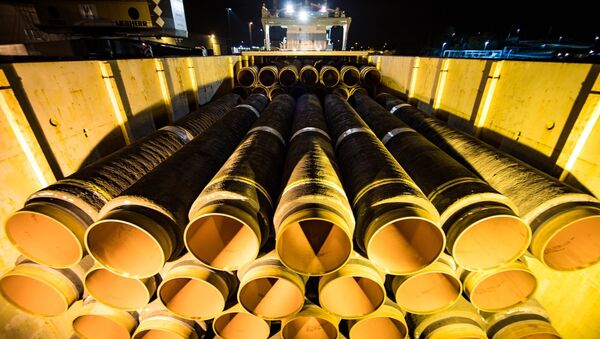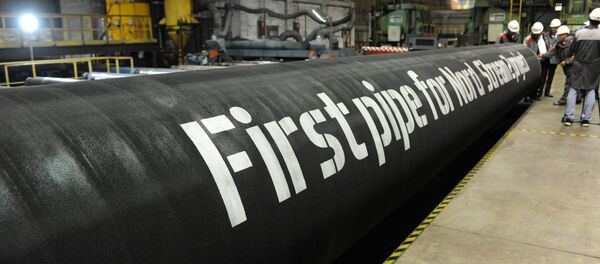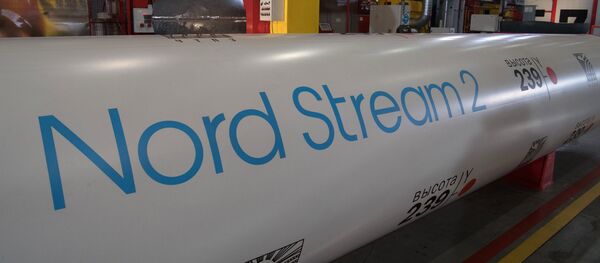Earlier in January, European companies participating in the venture aimed at building a new route for Russian gas to bypass Ukraine, reportedly received threatening letters from the US Ambassador to Germany Richard Grenell. He warned the firms about how their involvement in the project incurs the risk of sanctions.
When asked to comment on the matter, Markus Frohnmaier, a member of the Bundestag and an international expert expert for foreign affairs and economic cooperation, told Sputnik that "as the fourth-largest economy in the world, Germany has significant energy needs and Russia has been a reliable source of cheap gas in the past. It is not unusual for a highly developed country like Germany to rely on resource imports. But somehow, only when it comes to gas imports for Russia the question suddenly becomes controversial."
He voiced the belief that Berlin's need for gas would likely rise in the next few years. "The Netherlands, one of our major trading partners in gas, decided to stop producing gas by 2030. So Germany must ensure a constant supply of gas in the future anyway. Russia is willing to sell, and Nord Stream 2 is the way to get Russian gas to key industries of Germany, like the chemical industry."
"Buying, for example, expensive liquefied gas from the United States would only inflate consumer prices. Especially since most world leaders have pledged to support a reduction of trade barriers, I don't see why Germany can't do business with Russia in the energy market. Economically it's the most efficient way to satisfy our energy needs, as it plays to the comparative advantages of both Germany and Russia. Our European allies and partners would also profit from this, since we now have a free European gas market where Germany could resell any surplus gas it bought," he emphasised.
"Finally, this question is also a question of sovereignty. No one has the right to interfere with the decision of Germany and Russia to do business with each other," he concluded, adding that the German government should "more forcefully rebuke any attempts to meddle in our energy and trade policy in the future."
Pressure on Nord Stream 2 'a Way of Controlling Europe by Forcing it to Buy US LNG'
His comment was echoed by a former US diplomat based in Washington, DC, Michael Springmann, who stated that US pressure over the pipeline is basically another attempt by the US government to control both Europe and Russia.
"America has tried to block Russian gas pipelines that could deliver less expensive gas to Europe. The US seeks to use its pressure on Europe to harm the Russian economy through cutting natural gas sales. It is also a way of controlling Europe by forcing it to buy more expensive American liquified gas. This will also harm Europeans through increasing prices on a vital part of their economy."
National Rally (RN) member of the European Parliament Nicolas Bay also commented on the increasing US pressure on EU member states: “Americans want Europeans to buy their shale gas, not Russian natural, although the last one is cheaper, more reliable, more convenient for delivery and more environmentally friendly. For this, they (the US) are abusing their right to extraterritoriality. And the EU systematically gives way… despite that the decree of 1996 should protect our firms from the extraterritoriality of the American law. As a result, it is our interests, in particular the interests of the French Engie, that this legal war waged by the United States threatens."
According to Marcus Godwyn, a British politician commentator, the US in particular cannot afford Russian-German cooperation on this issue. "Now they are panicking as the completion of the Nord Stream pipeline will make it infinitely harder for the US to be a viable competitor as a gas supplier."
Political scientist Erhard Crome says that "the warning made by the current US Ambassador to Germany Richard Grenelle to various German and European companies involved in the implementation of the Nord Stream 2 gas pipeline project is an open threat. Even Heiko Maas, the German foreign minister, tried to take heart, noting that "the issues of European energy policy should be solved in Europe."
'World’s Most Geopolitically-Charged Pipeline'
The Nord Stream 2 is becoming the "world’s most geopolitically-charged pipeline" because of blatant US interference in the affairs of Germany and the European Union, Dr. Mamdouh Salameh, International oil economist and visiting professor of energy economics at the ESCP Europe Business School in London told Sputnik.
According to him, the United States’ opposition to the Nord Stream 2 is mainly motivated by self-interest and partly by geopolitics.
"The Nord Stream 2 has become a battle of wills between President Trump and German Chancellor Angela Merkel. Trump’s antagonism towards Merkel is partly personal, a reaction to her standing up to him and her very evident dislike of him, which she makes little attempt to hide. Germany considers Nord Stream 2 first and foremost an economic project which will bring uninterrupted and cheap Russian gas supplies to Germany and the EU thus ensuring energy security to the whole of the EU."
"The EU is determined to diversify its energy sources but not at any price. Germany is quietly building up LNG importing facilities but not as a gesture to the United States as some sources claim. The plain truth is that Germany is building LNG terminals not only for diversification of energy sources but also because of fast-rising demand for gas in Germany. Germany and the EU will only buy US LNG if its price matches the cheaper Russian piped gas."
Thus, Salameh concluded that Russian gas supplies have a reputation of being reliable and cheap and nothing can change this fact for the foreseeable future.
Alexander Azadgan, professor of international political economy, a senior geopolitical analyst and editor-at-large with Imperia News, also voiced his belief that technically, geopolitically, and strategically speaking, one could argue that if Europe stops importing gas from Russia it would constitute some form of an “economic suicide”.
"But with United States firmly transforming [and positioning itself] as the number one exporter of natural gas in the world followed by Russia, Qatar, and Iran, and taking into consideration the contrived spirit of paranoia and Russiaphobia during the past several years and with a chaos President such as Donald Trump at the helm, almost anything is possible and that more-or-less “all options are on the table”," he argued.
"While Europe once again finds itself at a cross-point to whether sway closer to the East (Russia and China) or maintain its long-cherished bond to the Transatlantic Alliance (on the West) is the question at hand. We believe with such German-Russia energy cooperation projects like the Nord Stream pipeline, we are witnessing some kind of a policy change. This will take quite a bit of time considering that Russia has been under US sanctions," he added.
According to Azadgan, "with more belligerent behaviour from Washington, this process may be hastened to the point that even with the usual lucrative concessions from the US, we may see a shift in the turning of tide. And with Russia carefully positioning itself with Europe, this could translate into a sizable gain for Russia, keeping in mind the geopolitical complexities with Ukraine when it comes to the natural gas market. But it is my opinion that it will NOT be an all-or-nothing scenario with Europe. They will diversify their natural gas suppliers in order to hedge their risks and not rock the boat too much."
According to Justin Dargin, Global Energy Scholar at the University of Oxford, "since its gestation, the Nord Stream 2 pipeline project has generated a inordinate amount of geopolitical wrangling."
"Indeed, in this modern drama, it is exceedingly difficult to unweave the political strands from this economic web as every major Western participant has clear financial and political incentives. And, undeniably, the multiple, often antagonistic, European positions illustrate quite starkly that Europe is still far from developing an adequate response to the query attributed to the former US Secretary of State Henry Kissinger when he mused, 'Who do I call when I want to call Europe?'"
He noted that Poland feels that the pipeline furthers "monopolistic tendencies," Ukraine reasons that Nord Stream 2 would reduce its importance as a key transit country for Russian gas to Europe, while Germany supports the project. "Denmark, somewhat in the middle, displays an ambivalence which borders on antipathy. Meanwhile, the US has adopted the position that the pipeline would reduce European energy security, and as a result, has been actively working to discourage European participation in the project. Furthermore, the US has proposed that its own gas exports would be more than ideal to replace Russian gas exports."
Christian Wipperfürth, a political scientist and energy policy expert, says that the pressure is amplified on Germany for political gain.
"I think the pressure is amplified so Germany would have to make concessions in other areas. It is not about the Nord Stream 2, it is about Germany becoming more compliant on other issues. It is the question of the trade balance surplus, or, for example, Germany recently withdrawing landing rights for the Iranian airlines — something that Germany did not want to do for many years, but has now given way under pressure from the US. "
“The United States has long made it clear that they are against the construction of Nord Stream 2" — Francis Perrin, Energy Specialist at the Interdisciplinary Research and International Strategy Institute (IRIS) says — This strong pressure during the Trump administration exploded, on the one hand, into pressure on EU members, and into overt or covert pressure on the firms which are involved in the project on the other hand… as well as through institutions that can contribute to the financing of this extremely important project."
Graziani Tiberio, political scientist and president of the Vision & Global Trends International Institute for Global Analyses in Rome, says that the objectives pursued by the US have a geostrategic nature and a long-term perspective. "Implementation of Nord Stream 2 is only part of the big game. The main goal is to cut all ties to the infrastructure of the transfer of resources between continental Europe and Russia. The United States is looking for any excuse to break up Europe, making it weaker, thus forcing it to turn to its ally, the United States. Another US goal, which bears the medium-term character, is to sell its shale gas to Europe, although they do not consider the problem of the complexity of its transportation across the ocean. Russia is interested in a strong, unshattered Europe as an economic partner, Russia needs a reliable buyer. Europe does not have sufficient resources to fulfil its economic tasks, so it needs Russia's raw materials."
Janusz Niedźwiecki, Polish independent publicist and public activist, Chairman of the European Council for Democracy and Human Rights says that the US pressure is purely political in its nature and constitute a part of a broader strategy.
“This strategy is de facto a development of the idea of the late adviser of President Nixon Zbigniew Brzezinski, who advocated the permanent separation of Russia from Western Europe through the neutralization of business contacts and social and cultural ties between Russia and Western Europe. With this understanding, the Nord Stream 2 project should actually become a hindrance, since its implementation will create the foundation for strong and mutually beneficial economic cooperation between Russia and the most influential EU country — Germany. And also because this gas pipeline does not pass through any country of Eastern Europe (which, according to the Brzezinski doctrine, should be used as an instrument of isolating Russia from Europe and Europe from Russia) and it will be impossible to prevent its work with the help of political influence after its construction, as it is possible today in Ukraine.
Despite what is constantly circulating in Polish media, Nord Stream 2 project will reduce tensions in our region since it will eliminate the disputes that have continued until now, connected with the transition of gas through Ukraine and as a result the problems of gas transit to Europe will stop being political. Taking into account the fact that the smooth transit of gas to Europe will strengthen Russia’s weight as a predictable and stable business partner, this should not be into the hands of those, who, for political reasons, prefer not to build bridges between Europe and Eurasia, but to build new walls.”
The views and opinions expressed in this article are solely those of the speakers and do not necessarily reflect Sputnik's position.







